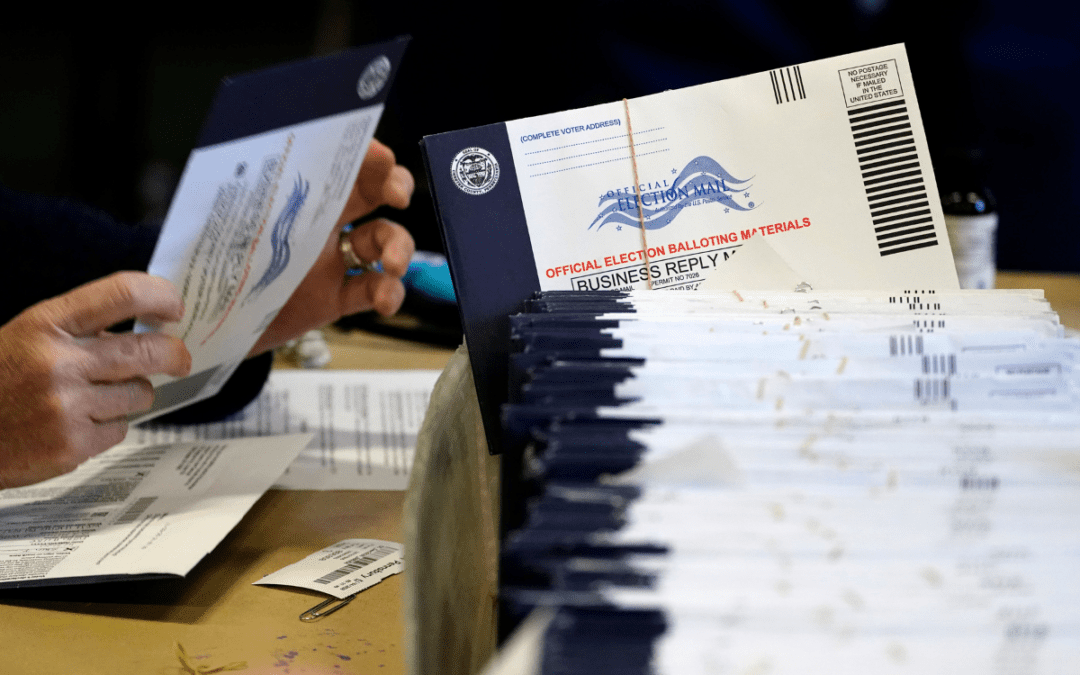
School staff pack grab-and-go meals for distribution to students and families at John H. Webster Elementary School in Philadelphia, Wednesday, March 25, 2020. (AP Photo/Matt Rourke)
Right now, almost all students in the commonwealth are eligible for a free meal, but that ends with the school year and has not been extended. Many think it should.
As a single parent, Steph Phillips worries a lot. She worries about whether she’s doing a good job, whether the economy will improve, whether costs will continue to rise, and whether her daughter will be happy and healthy.
She also knows the extreme relief when even one simple worry, such as the cost of a school lunch, is lifted from her long list of responsibilities.
“When you have to work out custody schedules and try to shuffle your child between homes, on top of everything else you have to deal with as a parent, it can be hard,” the 40-year old Allentown resident said. “Then, having to financially afford everything on your own, you worry if you’re doing a good job; if they are getting everything they need, even something as simple as a meal.”
Phillips, who works full time and is a mom to a fourth-grader at Kernsville Elementary School in Lehigh County, knows it’s not just single parents who struggle. Even working as a team, parents can sometimes face hardships. That’s why state Rep. Austin Davis (D-Allegheny), Gov. Tom Wolf, parents, and school organizations are urging Congress to extend the nationwide waivers of the school lunch program and provide free meals to all students again during the 2022-23 school year.
“If you ask any parent with kids in school, rich or poor or in between, they will probably tell you that over the last two years this program has been one of the few good things that has happened,” Davis said. “It’s one less stress for those working parents trying to get out the door in the morning, one less hard decision for the struggling parent trying to make ends meet and prioritize their bills.”
Waivers for the 2021-22 school year are set to expire on June 30 and can’t be offered past this date without approval by Congress. This means that the free lunches countless Pennsylvania families have relied on will expire, leaving millions of children without consistent access to food.
What Are School Lunch Waivers?
The National School Lunch Program (NSLP) is a federally assisted meal program operating in public and private schools and child care centers. It provides nutritionally balanced, low-cost or free lunches to children each school day.
The USDA, through its Food and Nutrition Service, administers the program at the federal level. The state education department operates the federal program at the state level through agreements with school districts. There are income guidelines to qualify for a free or reduced lunch.
Since the beginning of the pandemic, Congress allowed the waiver of income guidelines, meaning every Pennsylvania student was eligible for a free lunch. This was done to ensure the program could adapt to the fallout from the pandemic and that students still received a nutritious meal despite short- and long-term closures.
How Many Pennsylvania Children Are Eligible for Free or Reduced School Lunches?
More than 1.5 million Pennsylvanians, including more than 443,000 children, are at risk of hunger, according to Feeding Pennsylvania.
For some children, a school lunch might be their only source of food.
Pennsylvania had over 1.7 million students during the 2018-19 school year, according to school lunch reports from the state Department of Education. Of them, almost 900,000 (52%) were eligible for a free lunch and another 50,000 (3%) were eligible for a reduced-price lunch.
With the waivers, schools across the commonwealth served more than 16 million free lunches in November 2021 alone, according to state reports.
Why the Waivers Are Important
The cost of everything is going up, Phillips said, and that puts a strain on every family’s budget. Even something as simple as waiving the $2 to $3 fee of a school lunch (a total of $360-$540 per year) helps and is one less thing to stress about, she said.
“Could you imagine, as a parent, not being able to provide enough food for your child?” Phillips said. “I can’t work when I’m hungry. A child certainly can’t learn with an empty stomach.”

In addition to providing a free meal, the waivers also allowed flexibility as to how meals were served. This meant schools could hand out bagged lunches while schools were closed and students were learning virtually.
In February, the Wolf administration sent a letter to Pennsylvania’s congressional delegation, urging them to extend the waivers through the 2022-23 school year.
Earlier this month, Davis introduced a resolution at the state level urging Congress to extend the waivers.
“At a time when the price of everything from a loaf of bread to a gallon of gas is on the increase, allowing this program to end could be devastating for families and school finances,” Davis told the Keystone. “Making sure kids can eat a basic nutritional lunch should not be a budgetary luxury, or a bargaining chip. Why wouldn’t we make sure that every child, regardless of their background, has access to a nutritional meal?”
It wasn’t just students and parents that benefited from the waivers. Schools also received more federal reimbursements to cover the cost of extending the free lunch program to all students. This helped a lot of schools, said Andrew Armagost, director of Advocacy and Analytics with the PA Association of School Business Officials.
“Just letting the waivers expire could have impacts on the ability of school districts to return to normal operations,” he said.
Most schools won’t be able to withstand the rising costs of food, labor shortages, and supply chain disruptions if the waivers expire, Armagost said.
All but one school district in the state opted to provide free lunches this school year, said Kendall Alexander, spokesperson for the state education department. Seven schools in the Methacton School District in Montgomery County provided free lunches only to students whose families met the income guidelines as normally required.
While Phillips takes it one day at a time and doesn’t want to think about next school year, she does continue to worry.
“What will next school year look like,” she said. “Will more, different strains of COVID cause closures again? What will the economy be like? I don’t have a crystal ball. I can’t answer any of the worries I have. But it would be nice to have one certainty, even if it is something as simple as a free school lunch for my daughter.”
Politics

Pennsylvania redesigned its mail-in ballot envelopes amid litigation. Some voters still tripped up
HARRISBURG, Pa. (AP) — A form Pennsylvania voters must complete on the outside of mail-in ballot return envelopes has been redesigned, but that did...

Biden makes 4 million more workers eligible for overtime pay
The Biden administration announced a new rule Tuesday to expand overtime pay for around 4 million lower-paid salaried employees nationwide. The...

Malcolm Kenyatta makes history after winning primary for Pa. Auditor General
State Rep. Malcolm Kenyatta, who was first elected to the state House in 2018, won the Democratic nomination for Pa. Auditor General and will...
Local News

What do you know about Wawa? 7 fun facts about Pennsylvania’s beloved convenience store
Wawa has 60 years of Pennsylvania roots, and today the commonwealth’s largest private company has more than 1,000 locations along the east coast....

Conjoined twins from Berks County die at age 62
Conjoined twins Lori and George Schappell, who pursued separate careers, interests and relationships during lives that defied medical expectations,...






